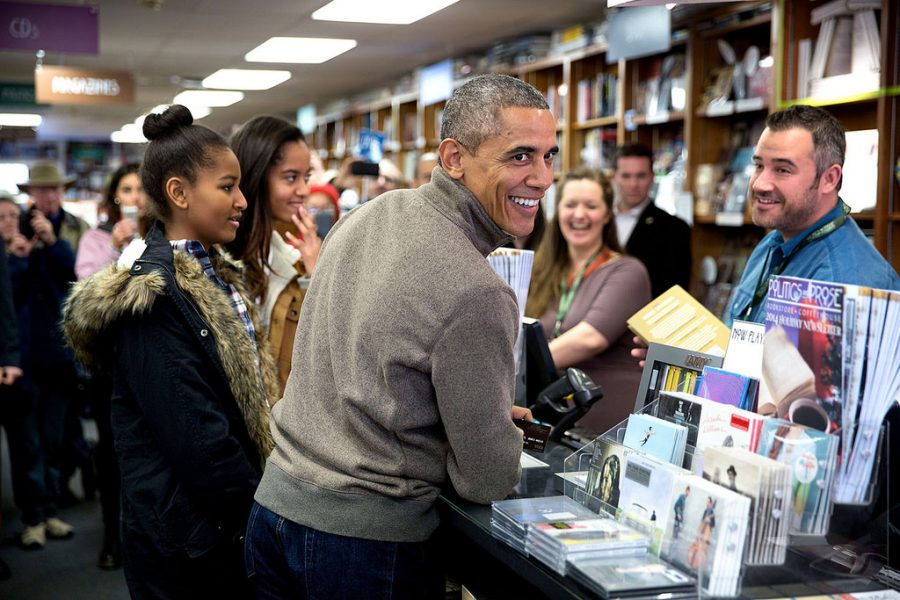
Photo by Pete Souza via obamawhitehouse.archive.gov
As is his custom, Barack Obama posted on Facebook his summer reading list, a mix of novels, memoirs, and instructive non-fiction. If you haven't achieved the perfect state of tsundoku, you can get a few new reads for the waning days of summer. President Obama writes:
It's August, so I wanted to let you know about a few books I've been reading this summer, in case you're looking for some suggestions. To start, you can't go wrong by reading or re-reading the collected works of Toni Morrison. Beloved, Song of Solomon, The Bluest Eye, Sula, everything else — they're transcendent, all of them. You’ll be glad you read them. And while I’m at it, here are a few more titles you might want to explore:
Sometimes difficult to swallow, The Nickel Boys by Colson Whitehead is a necessary read, detailing the way Jim Crow and mass incarceration tore apart lives and wrought consequences that ripple into today.
Exhalation by Ted Chiang is a collection of short stories that will make you think, grapple with big questions, and feel more human. The best kind of science fiction.
Wolf Hall, Hilary Mantel’s epic fictionalized look at Thomas Cromwell’s rise to power, came out in 2009, but I was a little busy back then, so I missed it. Still great today.
Haruki Murakami’s Men Without Women examines what happens to characters without important women in their lives; it'll move you and confuse you and sometimes leave you with more questions than answers.
American Spy by Lauren Wilkinson is a whole lot more than just a spy thriller, wrapping together the ties of family, of love, and of country.
The Shallows by Nicholas Carr came out a few years ago, but its arguments on the internet’s impact on our brains, our lives, and our communities are still worthy of reflection, which is something we all could use a little more of in this age.
Lab Girl by Hope Jahren is a beautifully written memoir about the life of a woman in science, a brilliant friendship, and the profundity of trees. Terrific.
Inland by Téa Obreht just came out yesterday, so I won’t spoil anything. But those of you who’ve been waiting for Obreht’s next novel won’t be disappointed.
You’ll get a better sense of the complexity and redemption within the American immigrant story with Dinaw Mengestu’s novel, How to Read the Air.
Maid by Stephanie Land is a single mother’s personal, unflinching look at America’s class divide, a description of the tightrope many families walk just to get by, and a reminder of the dignity of all work.
POTUS' previous lists of recommended books can be found in the Relateds below.
Would you like to support the mission of Open Culture? Please consider making a donation to our site. It's hard to rely 100% on ads, and your contributions will help us continue providing the best free cultural and educational materials to learners everywhere.
Also consider following Open Culture on Facebook and Twitter and sharing intelligent media with your friends. Or sign up for our daily email and get a daily dose of Open Culture in your inbox.
Related Content:
Barack Obama Shares a List of Enlightening Books Worth Reading
The 5 Books on President Obama’s 2016 Summer Reading List
A Free POTUS Summer Playlist: Pres. Obama Curates 39 Songs for a Summer Day
The Books on Barack Obama’s Summer Reading List: Naipaul, Ondaatje & More
The Books on Barack Obama’s Summer Reading List (2019) is a post from: Open Culture. Follow us on Facebook, Twitter, and Google Plus, or get our Daily Email. And don't miss our big collections of Free Online Courses, Free Online Movies, Free eBooks, Free Audio Books, Free Foreign Language Lessons, and MOOCs.
from Open Culture https://ift.tt/2TKJrJY
via Ilumina
Comments
Post a Comment